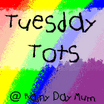
I have twin girls who are now 14 months old as of last Friday (March 29th). They are definitely in the parrot stage, and I know it will continue to progress as the months go by. I will have to watch what I say the older they get, though! They are hilarious and love to talk. They will wave, clap, point, put their arms up in the air, and shake their heads. They can now bark like their dog, Bear, and growl like a bear when we make the sounds. Just yesterday, my husband and I took them for a walk in our neighborhood, and they barked along with a dog they heard on our route. They will say "uh-oh" when they drop something, "go" when we say "ready, set, go" before rolling a ball or knocking down blocks, and "yay" when we praise them for doing something good. One of my twins now repeats "no, no, no" when I tell her no and try to redirect her from what she was doing that is not allowed in our house. Of course I try not to laugh, but it's getting really tough these days! My girls also say "dada" constantly and "mama" only when they want or need something (so typical!). Usually I hear it around bedtime when they're exhausted from the day's activities. Every little gesture, sound, word, and attempt at words makes their speech therapist mama so happy and proud of their accomplishments, especially because they were born 8 weeks early!
But, what if your child is not imitating your sounds, words, and gestures? What should you do? First, you should talk as much as you can to your child. Talk about what you're doing and talk about what your toddler is doing. You can also perform gestures such as clapping and waving to see if your toddler will imitate you. Pair these gestures with sounds such as "yay" for clapping or "hi" and "bye" when waving. Say "whee" when sliding down a slide or swinging, and "uh-oh" when your toddler drops something. The key is to be consistent with your words, sounds, and gestures. Your toddler should eventually catch on and repeat what he or she hears you say and sees you do. Don't forget to praise your toddler when he or she imitates you or attempts to imitate you. By praising your toddler, you're encouraging him or her to communicate and imitate you even more.
To learn more speech and language tips to help your toddler talk and communicate faster, be sure to check out my book on Amazon Kindle, Talking With Todders - 52 Tips to Boost Speech and Language Skills.

 RSS Feed
RSS Feed



